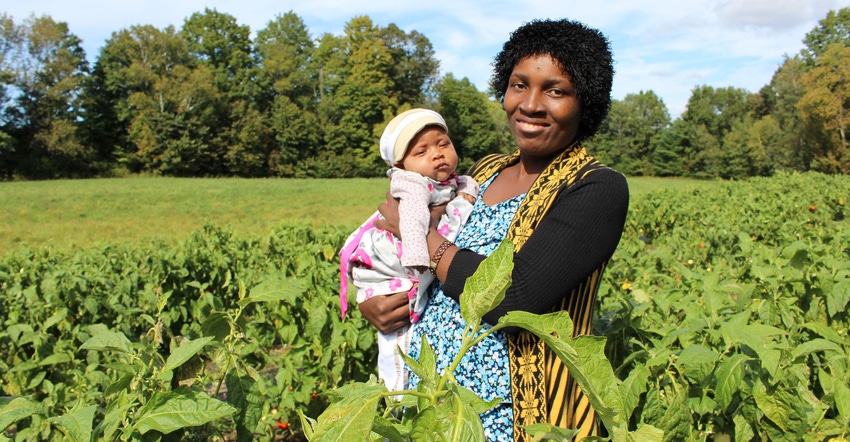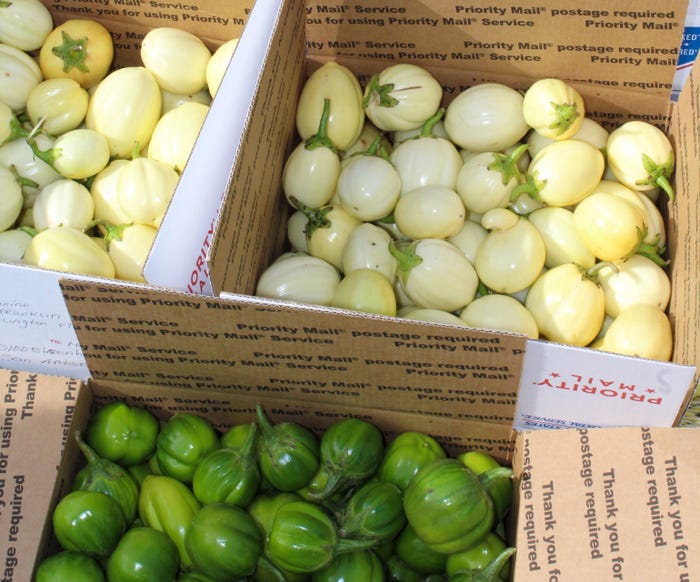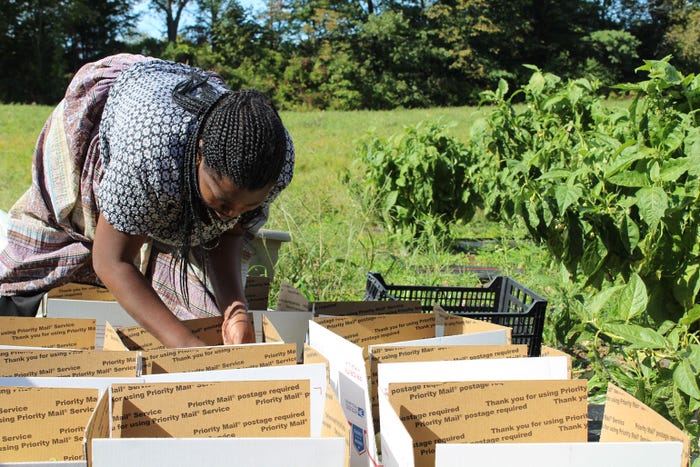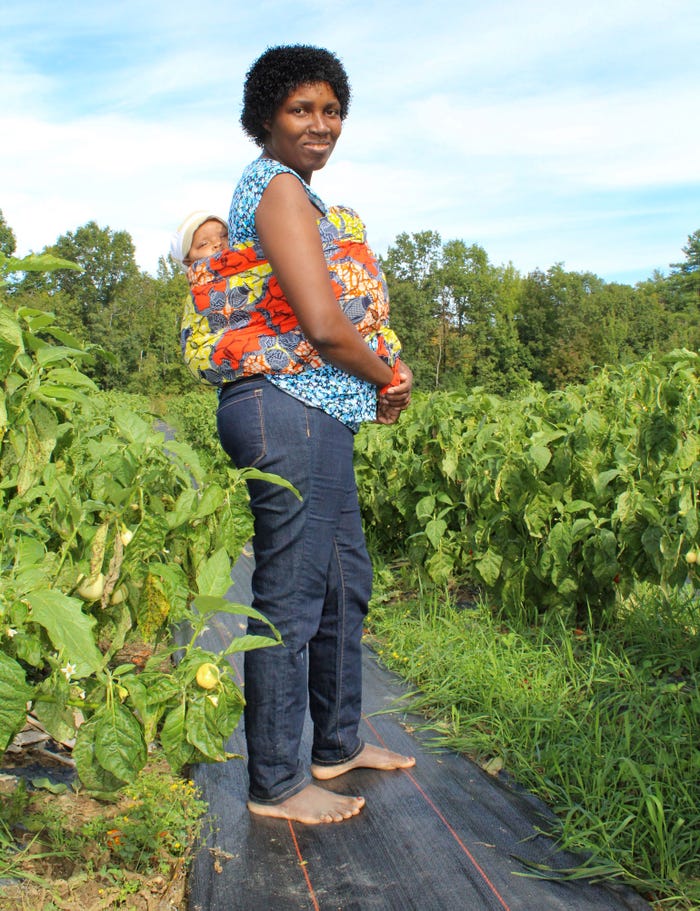November 20, 2018

Farming has attracted Janine Ndagijimana ever since she brokered tomatoes, eggplants and other vegetables in Africa.
A native of Burundi, Ndagijimana spent 13 years in a refugee camp in Rwanda and then years in Tanzania before coming to the U.S. in 2012, ending up in Burlington, Vt.
"It was good money, and that's when I became interested in farming," Ndagijimana said through her interpreter, Liliane Ndizihiwe. "When I first came to Burlington, I had a small garden to grow eggplant. I saw that people were interested in the eggplant. So, I put a picture on Facebook page and got a good response, because many Africans like the eggplant. You can mix it with fish, cook it with meat or eat it without cooking it at all."
Today, Ndagijimana runs a successful farming operation, growing several thousand pounds of African eggplants a month. She packs the light green vegetable into U.S. Postal Service boxes and ships them around the country to customers in Michigan, Utah, Arizona and Texas, many of whom are native Africans. One customer from Florida bought more than 1,000 pounds.
Overcoming challenges
Ndagijimana would like to get more local people interested in the eggplant, but its bitter taste has not garnered a local market. Still, the business helps Ndagijimana support her family of six children.
In Africa, the eggplant, also known as intore, is produced year-round. Like other plants that originate in warm climates, it can be difficult to grow in Vermont. To overcome that, Ndagijimana has learned practices such as laying black plastic to retain water and heat, and she’s also built two greenhouses that allow her to keep harvesting her crop through November.
She also uses greenhouses at New Farms for New Americans, a nonprofit program in Burlington that leases three-quarters of an acre to her for the business. She's also been helped by local landowner Gene Button, who has loaned her some of his land and expertise.
 DISTANT CUSTOMERS: Ndagijimana mails the majority of her African eggplants to customers around the country, many of whom recently came from African countries.
DISTANT CUSTOMERS: Ndagijimana mails the majority of her African eggplants to customers around the country, many of whom recently came from African countries.

While NFNA helped her get the business off the ground, Ndagijimana has a tireless work ethic that suits her well.
"What sets Janine apart is her knack for being an entrepreneur, plus she's a great farmer. She knows what people want and navigates within the markets there are," says Alisha Laramee, NFNA program specialist. "She just wants to learn, learn, learn, and she's a hard worker."
Finding a home in Vermont
Over the past 20 years Vermont has welcomed 7,500 refugees like Ndagijimana, most of whom have settled in the Burlington area. AALVT, formerly the Association of Africans Living in Vermont, was founded in 2003 to help African refugees, but it has expanded to help refugees from other countries such as Bhutan, Vietnam, Bosnia and Somalia.
AALVT began the New Farms for New Americans program 10 years ago with the goal of helping refugees, many of whom farmed in their home countries, grow their own fresh food and perhaps become commercial farmers.
On 5 acres in the Ethan Allen Homestead in Winooski and 3 acres in Burlington's Intervale, NFNA rents out plots costing $100 per season for one-eighth of an acre. Nearly 100 farmers collectively raise an average 100 tons of produce each year, most of it vegetables from their homelands.
 HECTIC HARVEST: Ndagijimana's friend, Conliia Niyonzima, helps harvest intore, a bigger African eggplant.
HECTIC HARVEST: Ndagijimana's friend, Conliia Niyonzima, helps harvest intore, a bigger African eggplant.

But Ndagijimana is unique among NFNA farmers as she has expanded into her own commercial business. Although workforce development was the organization's first goal, its focus has shifted to developing community gardens, helping refugees raise fresh food for their families and promoting social inclusion. Commercial farming just hasn't taken hold.
"It sounds like a great thing to keep being a farmer, but it's hard to be a commercial farmer in the United States," Laramee says. "There are barriers. Insurance policies are a big one, and how markets work, using computers and setting up websites."
Insufficient access to land and Vermont's short growing season also make it hard. The biggest obstacle, though, is overcoming the language barrier.
"Access to land, capital and production resources are huge challenges, but the social disadvantage of not being able to communicate underlies all of these hurdles," says Ben Waterman, coordinator of the New Farmer Program for University of Vermont Extension, which provides technical help. Often, he says, these refugees just don't have the time to learn English.
"If it's not six children, it's working a night shift and being exhausted all day long running on two hours of sleep," he says. "If it’s not that, it's holding three day jobs at one time to make ends meet.
 WRAPPING UP: Ndagijimana’s 2-acre field of African eggplants will be sown with a cover crop. Production will rotate to another field next year.
WRAPPING UP: Ndagijimana’s 2-acre field of African eggplants will be sown with a cover crop. Production will rotate to another field next year.

"I still think there is hope and a lot of room for improvement as long as it is at an appropriate pace. Farming, working the soil, food production … is a universal language, and the resettled refugee farmers here already know it very well."
Ndagijimana has set her sights on owning a bigger farm, learning how to drive a tractor and, perhaps, buying her own tractor.
Harlow writes from Vermont.
About the Author(s)
You May Also Like




